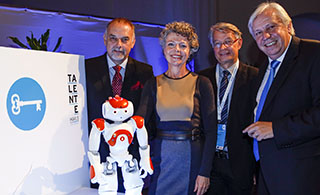![]() In the beautiful region of “Schloss Grafenegg” in Lower Austria, a congress that focussed on gifted children took place. It served as the starting point for the “Talentehaus” with a program for gifted children in the STEM-subjects. The “Talentehaus” and the congress were initiated by the “NÖ Landesakademie”, which is under the management of Dr. Milota, and by the government of Lower Austria. Experts from the scientific and practical sector held speeches and workshops. Prof. Dr. Camilla Benbow from the Vanderbilt University in Tennessee captivated the audience with her presentation on longitudinal studies pertaining to gifted children. She pointed out the necessity of fostering the gifted because of the positive impact it has on the children as well as on society. Prof. Dr. Aljoscha Neubauer from the University of Graz reached the same conclusion. He also referred to the positive correlations between the intelligence of a country and its GDP. Prof. Dr. David Lubinski from the Vanderbilt University explained further outcomes of the longitudinal studies pertaining to gifted children and mentioned that interests are also of importance. Other speakers also presented an overview of activities geared towards gifted children in Austria: MMag. Dr. Claudia Resch from the özbf spoke about the “Weißbuch”, and MMag. DDr. Andrea Richter, the director of school psychology in Lower Austria, spoke about different programs in Austria. Additionally, Dr. Thomas Köhler talked about the history and philosophy of science in regards to gifted children. International input came from Dr. Stanislav Zelenda from the Czech Republic and Csilla Fuszek from Hungary. Stanislav Zelenda spoke about the TALNET program, in which gifted children are primarily supported via the internet.
In the beautiful region of “Schloss Grafenegg” in Lower Austria, a congress that focussed on gifted children took place. It served as the starting point for the “Talentehaus” with a program for gifted children in the STEM-subjects. The “Talentehaus” and the congress were initiated by the “NÖ Landesakademie”, which is under the management of Dr. Milota, and by the government of Lower Austria. Experts from the scientific and practical sector held speeches and workshops. Prof. Dr. Camilla Benbow from the Vanderbilt University in Tennessee captivated the audience with her presentation on longitudinal studies pertaining to gifted children. She pointed out the necessity of fostering the gifted because of the positive impact it has on the children as well as on society. Prof. Dr. Aljoscha Neubauer from the University of Graz reached the same conclusion. He also referred to the positive correlations between the intelligence of a country and its GDP. Prof. Dr. David Lubinski from the Vanderbilt University explained further outcomes of the longitudinal studies pertaining to gifted children and mentioned that interests are also of importance. Other speakers also presented an overview of activities geared towards gifted children in Austria: MMag. Dr. Claudia Resch from the özbf spoke about the “Weißbuch”, and MMag. DDr. Andrea Richter, the director of school psychology in Lower Austria, spoke about different programs in Austria. Additionally, Dr. Thomas Köhler talked about the history and philosophy of science in regards to gifted children. International input came from Dr. Stanislav Zelenda from the Czech Republic and Csilla Fuszek from Hungary. Stanislav Zelenda spoke about the TALNET program, in which gifted children are primarily supported via the internet.
 Another approach is used by the European Talent Centre in Budapest, which promotes activities for gifted children via networking. Csilla Fuszek explained how such networking can be successful. Mag. Andrea Pinz addressed the pedagogical view of the topic, whereas Mag. Gehringer Braun described the HAWIK IV (a Wechsler test), which is a well-known intelligence test. Mag. Dr. Edith Blaschitz and MMag. Nina Grünberger devoted themselves to the topic of coaching and how one can coach the coach. All in all, the diverse topics gave each visitor the possibility to attend the most interesting presentations and to leave the congress with new impressions from the scientific and practical sector in Austria and from around the world.
Another approach is used by the European Talent Centre in Budapest, which promotes activities for gifted children via networking. Csilla Fuszek explained how such networking can be successful. Mag. Andrea Pinz addressed the pedagogical view of the topic, whereas Mag. Gehringer Braun described the HAWIK IV (a Wechsler test), which is a well-known intelligence test. Mag. Dr. Edith Blaschitz and MMag. Nina Grünberger devoted themselves to the topic of coaching and how one can coach the coach. All in all, the diverse topics gave each visitor the possibility to attend the most interesting presentations and to leave the congress with new impressions from the scientific and practical sector in Austria and from around the world.